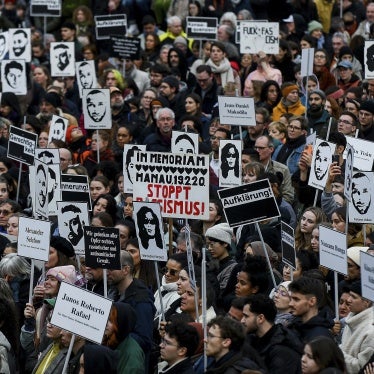(New York) – The Bangladeshi authorities should immediately charge or release Asad Uddin, a key member of the defense team in the war crimes trial against Motiur Rahman Nizami, Human Rights Watch said today. Uddin’s arrest comes two weeks ahead of key appeals and review hearings in the cases of two men, both senior members of the Jamaat-e-Islami party, convicted by the war crimes tribunal.
Uddin was travelling to his hometown in Sirajganj when he was detained on October 22, 2015, at around 2:30 p.m. According to an eyewitness, armed men in both police uniforms and plainclothes stopped the bus he was travelling on immediately after it had crossed the Jamuna River Bridge. They identified themselves as members of the detective branch of the police and detained Uddin. The bus driver and some other eyewitnesses on the bus immediately notified Uddin’s family, who tried to register a complaint with the police. The police rejected the application, and denied having him in custody in spite of credible evidence obtained by his family that he is being held in the detective branch of the Sirajganj Police Station.
That same day in the evening, the uniformed police raided the house of another defense counsel, Mohammad Shishir Manir, stating to those present that they were there to arrest him. They left after not finding Shishir at home. Shortly after, men in plainclothes, who identified themselves as members of the detective branch, again entered Shishir’s home, detained his driver, and questioned the driver for several hours before finally releasing him.
On October 25, Asad Uddin was produced before the Chief Metropolitan Magistrates Court in Dhaka, where police argued that they needed more time to question him because they suspected a conspiracy to “overthrow the government and obstruct the war crimes trials.” On October 26, the magistrate remanded Uddin to two days remand in the Dhaka Central Jail.
“The detention of Uddin and the raid on Shishir’s home are deeply worrisome,” said Brad Adams, Asia director at Human Rights Watch. “The arrest and raid seem to be an effort to intimidate lawyers acting as defense counsel at the war crimes tribunal with flimsy allegations, a shocking breach of the rule of law.”
Human Rights Watch noted that Bangladeshi authorities have a history of harassing defense lawyers acting on behalf of those accused of war crimes committed during the country’s 1971 War of Independence. Following a warrantless raid by armed police on the office of a defense team in October 2012, the war crimes tribunal issued an order instructing the security services to ensure the physical security of all defense counsel involved in these cases. The arrest of Uddin and the raid on Shishir’s home are in direct violation of that order.
Both Bangladeshi and international law recognize the importance of the need to protect the ability of lawyers to work freely without intimidation, whether on the prosecution side or the defense. In the absence of such protection, the accused are unable to freely communicate with their counsel, and counsel are then unable to represent their clients fully.
Human Rights Watch noted that the October 22, 2015, police actions come shortly before two important hearings slated for November 2 and November 3, in which Uddin and Shishir are involved as counsel. On November 2, there is a review petition in the case of Ali Ahsan Mohamed Mujahid, who is asking for the right to appeal against his death sentence conviction. His previous appeals application has been rejected by the appellate division of the Supreme Court of Bangladesh. If the review petition fails, then Mujahid faces imminent execution. On November 3, the appellate division of the Supreme Court is slated to hear the appeal of Nizami against his death sentence conviction at the trial stage. Both trials, like others before the war crimes court, have been plagued by credible allegations of serious fair trial violations.
“These latest attacks on defense counsel involved in imminent critical hearings lend another devastating blow to the credibility of the war crimes trials,” said Adams. “We have long called for accountability for the crimes of the 1971 war, but they cannot come at the cost of fair trials.”








